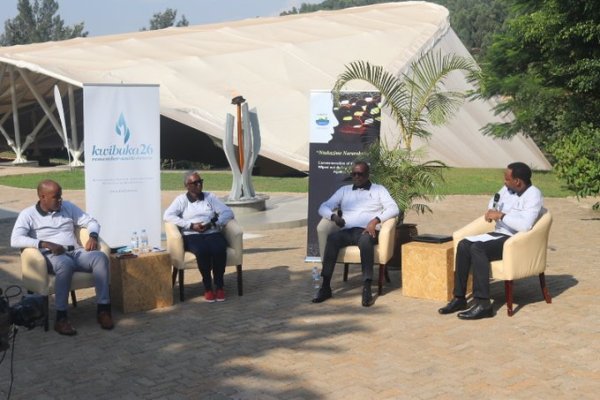
Kigali: A family is said to have been wiped out; when all members of the family (parents and children) were killed during the Genocide.
The organisation of former students who survived the Genocide against the Tutsi (GAERG), on this Saturday commemorated the families completely wiped out during the Genocide against the Tutsi.
A family is said to have been wiped out; when all members of the family (parents and children) were killed during the Genocide.
Similar to other Kwibuka26 activities, the commemoration of the completely wiped out families was held in adherence to the COVID-19 prevention measures, through Radio and Television programmes and social media by sharing messages and small videos.
A talk show was organized on Rwanda Television focusing on the importance of commemorating the families wiped out and the issue of denying the Genocide against the Tutsi.
During the discussions, Dr Jean-Damascène Bizimana, Executive Secretary of the National Commission for the Fight against Genocide (CNLG) explained the trajectory to the recognition of the genocide against the Tutsi.
During the discussion that was also attended by Egide Gatari, president of GAERG and Anita Tumusenge whose relatives families were wiped out, Dr Bizimana recalled the history of denial and trivialisation of the genocide against the Tutsi
The discussions also focused on the role of various institutions in educating future generations about the Genocide against Tutsi; the importance of commemoration and remembering wiped out families, especially with the aim of discouraging and fighting against genocide deniers.
During this 26th Commemoration, Rwandans have been advised to refrain from rhetoric, publicity and other acts that promote hatred and discrimination leading to the ideology of Genocide.
The findings of the research into and strategies to counter different forms of denial and minimization of the Genocide against the Tutsi in foreign countries, 2019 by the Senate of Rwanda, has identified five channels of denying and belittling the Genocide against Tutsi; including the press and publishing houses, conferences and demonstrations, international organizations and churches, international and national, Justice, politicians, political parties and foreign States.
In the study, the Senate outlined possible ways to overcome this problem, and classified it into five categories: Justice, International Cooperation, Research, Media, Non-Governmental Organisations and Churches.
The Senate called for efforts to be made through various channels to spread the truth about the Genocide against the Tutsi.
In the message through her twitter account, Her Excellency Jeannette Kagame, on the commemoration of families that were completely wiped out during the 1994 Genocide against the Tutsi, she stated “As we remember the families who were completely wiped out during the 1994 Genocide against the Tutsi, let their memory be a reminder that total extermination is the indisputable uniqueness of a genocide. Let us continue nurturing our children the values of humanity, dignity, and respect for one’s neighbour. Let us recommit to fighting the genocide ideology and denial, grounded in our journey as a testament to our ability to fight evil with good”.
Since 2009, the IBUKA affiliate of former students who survived the Genocide against the Tutsi (GAERG); prepares and implements the commemoration of families wiped out in the Genocide against the Tutsi.
GAERG has enumerated those families in all 30 districts of Rwanda; the figures available to
date show that 15,593 families made of 68,871 people were wiped out.
The association started a project to write a book on these families, a documentary movie and a database to safeguard their history. (End)
